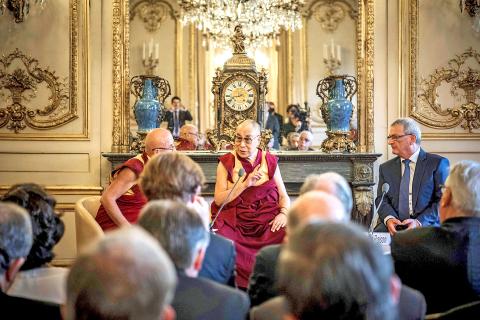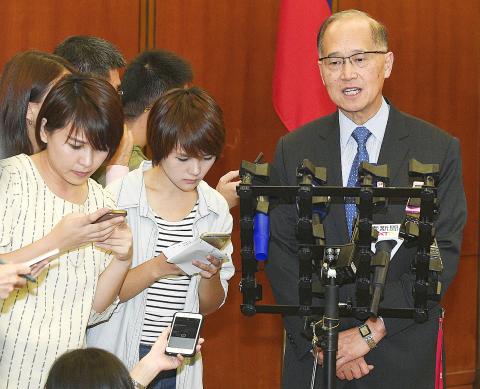China yesterday warned Taiwan not to allow exiled Tibetan spiritual leader the Dalai Lama to visit, after New Power Party Legislator Freddy Lim (林昶佐) issued an invitation.
President Tsai Ing-wen (蔡英文) has not said whether the government would allow a visit by the Dalai Lama, who congratulated Tsai on her “remarkable” victory in the Jan. 16 election.
Lim, an outspoken critic of Beijing, invited the Dalai Lama when he met him in India last week.

Photo: AFP
Ma Xiaoguang (馬曉光), spokesman for China’s Taiwan Affairs Office, told a regular news briefing in Beijing that the Dalai Lama “wears religious clothes to carry out separatist activities.”
“The intention of some forces in Taiwan to collude with separatists seeking ‘Tibet independence’ and to create disturbances will have a severe impact on relations across the Taiwan Strait,” Ma said. “We firmly oppose any form of visit.”
Lim’s assistant, Kenny Chang (張庭瑜), said that the Dalai Lama is highly respected in Taiwan and that Lim invited him “to share his ideas and religious philosophy.”

Photo: Chen Chih-chu, Taipei Times
On Tuesday, Minister of Foreign Affairs David Lee (李大維) told lawmakers that if the Dalai Lama decided to come, the ministry would review the matter carefully, Chinese-language media reported.
A ministry spokeswoman told reporters: “If he submits his [visa] application, the government will handle it based on relevant rules.”
Tenzin Taklha, an aide to the Dalai Lama in Dharamsala, India, the seat of the Tibetan government-in-exile, declined to comment yesterday when reached by telephone.
The Dalai Lama is currently on a visit to Europe. Yesterday he met with a group of French lawmakers at the Senate in Paris.
Former president Ma Ying-jeou (馬英九) refused the Dalai Lama entry several times after his last visit to Taiwan in 2009.
In 2008, the Democratic Progressive Party (DPP) criticized Ma’s administration for refusing to grant the Dalai Lama entry.
According to the Chinese-language Liberty Times (the Taipei Times’ sister newspaper), at the time Tsai characterized the Dalai Lama as “a friend of Taiwan” who was denied entry because Ma Ying-jeou was “afraid of China.”
She was quoted as saying that the nation should not be intimidated by China and that as DPP chairperson, she would be “steadfast in defending” this position.
Presidential Office spokesman Alex Huang (黃重諺) yesterday said that the office “would not comment on a hypothetical case.”
DPP spokesman Yang Chia-liang (楊家俍) last night said the DPP has long been concerned with religious freedom in China.
The government has rules it must follow in issuing visas and the DPP respects that, he said.
DPP Legislator Gao Jyh-peng (高志鵬), approached as he was leaving a Central Standing Committee meeting at the DPP’s headquarters in Taipei, said that he hoped the government would “tough it out” to welcome the Dalai Lama.
“From the perspective of the freedom of speech and asserting Taiwan’s sovereign independence, we have no cause to follow the example of the Ma [Ying-jeou] administration in refusing the Dalai Lama’s visit,” Gao said.
Additional reporting by Su Fang-ho

MAKING WAVES: China’s maritime militia could become a nontraditional threat in war, clogging up shipping lanes to prevent US or Japanese intervention, a report said About 1,900 Chinese ships flying flags of convenience and fishing vessels that participated in China’s military exercises around Taiwan last month and in January have been listed for monitoring, Coast Guard Administration (CGA) Deputy Director-General Hsieh Ching-chin (謝慶欽) said yesterday. Following amendments to the Commercial Port Act (商港法) and the Law of Ships (船舶法) last month, the CGA can designate possible berthing areas or deny ports of call for vessels suspected of loitering around areas where undersea cables can be accessed, Oceans Affairs Council Minister Kuan Bi-ling (管碧玲) said. The list of suspected ships, originally 300, had risen to about 1,900 as

Japan’s strategic alliance with the US would collapse if Tokyo were to turn away from a conflict in Taiwan, Japanese Prime Minister Sanae Takaichi said yesterday, but distanced herself from previous comments that suggested a possible military response in such an event. Takaichi expressed her latest views on a nationally broadcast TV program late on Monday, where an opposition party leader criticized her for igniting tensions with China with the earlier remarks. Ties between Japan and China have sunk to the worst level in years after Takaichi said in November that a hypothetical Chinese attack on Taiwan could bring about a Japanese

MORE RESPONSIBILITY: Draftees would be expected to fight alongside professional soldiers, likely requiring the transformation of some training brigades into combat units The armed forces are to start incorporating new conscripts into combined arms brigades this year to enhance combat readiness, the Executive Yuan’s latest policy report said. The new policy would affect Taiwanese men entering the military for their compulsory service, which was extended to one year under reforms by then-president Tsai Ing-wen (蔡英文) in 2022. The conscripts would be trained to operate machine guns, uncrewed aerial vehicles, anti-tank guided missile launchers and Stinger air defense systems, the report said, adding that the basic training would be lengthened to eight weeks. After basic training, conscripts would be sorted into infantry battalions that would take

DEEP-STRIKE CAPABILITY: The scenario simulated a PLA drill that turned into an assault on Taiwan’s critical infrastructure, with the launchers providing fire support Taiwan yesterday conducted this year’s first military exercises at Longsiang Base in Taichung, demonstrating the newly acquired High Mobility Artillery Rocket System’s (HIMARS) ability to provide fire support and deep-strike capabilities. The scenario simulated an attack on Penghu County, with HIMARS trucks immediately rolling into designated launch areas and firing barrages at the Wangan (望安) and Cimei (七美) islands, simulating the provision of fire support against invading forces. The HIMARS are supposed to “fire and leave,” which would significantly increase personnel and equipment survivability, a military official said. The drill simulated an exercise launched by the Chinese People’s Liberation Army (PLA) Eastern